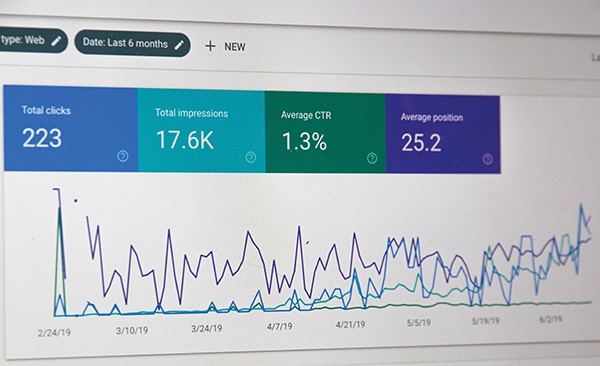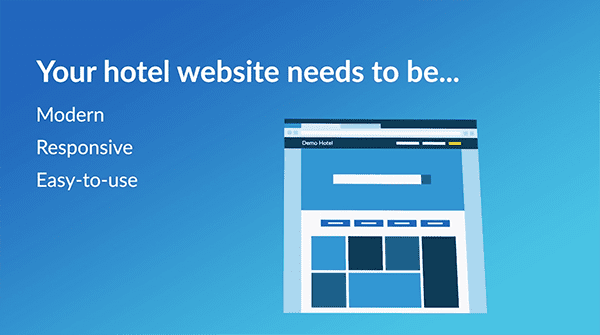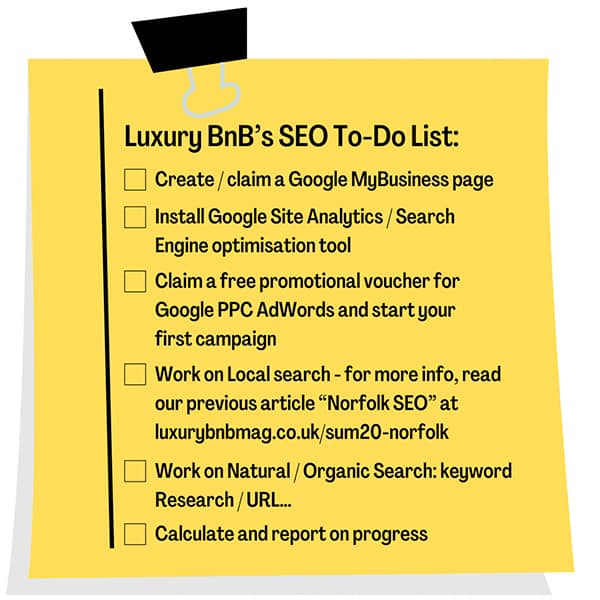
We have been serialising sections of The Complete Guide to Hotel Marketing, an ebook by our partners, SiteMinder.

If there’s one thing that can complicate and disrupt the booking journey for hotels, it’s the ever-changing search engine landscape.
Considering the first page of search engine results receive more than 90% of all traffic, for your hotel to be found on Google you need to prioritise key components of ‘search engine optimisation’. The first page of Google is such a competitive battleground and your hotel needs to get everything right to be in the eyes of prospective guests.
With Google constantly updating its algorithms and strategy, traffic coming in from multiple devices, and inconsistent SEO practices from travel websites, it’s hard for hotels to get a clear picture of what is working and what needs to be done to increase traffic and conversions in the future.
HERE’S SIX WAYS TO KEEP GOOGLE HAPPY
1. Plan your key words effectively
This requires you to approach the task from the guest’s perspective. Think about what travellers would be searching for on Google when planning their travel and looking for hotels to book in your area. Once you’ve thought about this you can develop a list of keywords you want to sprinkle throughout your website and analyse the traffic they drive before you implement them. A list of 10 is always a good start. It makes it easier for you to research and evaluate their effectiveness, and quicker for you to integrate them into your site.
2. Create a Google My Business Account
Google My Business is a free listing that optimises all your hotel’s information into the right fields and makes it easier for travellers to get the details they want. This includes your hotel’s address and phone number, Google maps geo-marker, hotel photos, guest reviews, and other relevant information such as amenities. Providing you complete your listing properly, with the features listed above, Google My Business makes your hotel website instantly more accessible to travellers searching on Google.
3. Consider using Google Hotel Ads
While Google Hotel Ads is a paid service it’s an effective way to get noticed on Google and Google Maps, and it allows guests to immediately begin the booking process. The other benefit is that you’ll only pay once your ad generates a click or a booking, and will only appear when travellers are searching for something that meets the specifics of your property. It allows travellers to filter their results to suit their needs, meaning the ratio of bookings you get per click is likely to be higher and worth your investment.
4. Track demand and search data
SEO is not a set-and-forget strategy. Hoteliers must be constantly on their toes to ensure they maintain their ranking, By keeping track of search and demand trends for your city, you can make more intelligent decisions about the content on your website. Remember that seasonality plays a big role in what travellers search for so changing your keywords to reflect updates to your packages/promotions or blog posts is very important. It will also mean you’re setting your rates accurately.
5. Treat content as an essential
High quality content is always going to please Google’s algorithms and it will increase your chances of converting site visitors into bookings too. Maintaining a blog is the best way to do this and ensure your content is always fresh. Consider publishing a post at least once a week, sharing it on your social media pages, and sending emails to your database too. Content also means visual content. High quality images will help attract attention to your website on listings and impress your site visitors, and you can attach keywords to your images. You should consider investing in a certified photographer to implement a 360 degree tour of your property. This will appear on your Google listing as ‘See Inside’. The more content you have the more backlinks and external links you can use to strengthen your appeal to Google’s algorithm and also increase the amount of traffic flowing through to your website.
6. Prioritise online reviews
No one is going to book a hotel on face value. You can promote your property all you want but in the grand scheme of things, travellers will always trust their peers over you, at least before the first time they stay. This is why you need verified reviews visible on search engines and metasearch sites, preferably five-star responses. To give your hotel credibility you need to respond to as many reviews as possible, especially any negative comments. Guests want to see that you care about their experience and are working to improve your service and get to know them better. There is no quick fix to your SEO and Google rankings, and there are many other tactics you can use than are listed here. It requires regular vigilance and updating on your behalf to maintain your Google rankings. It’s important that you utilise Google Analytics to collect and learn from data. Analysis is important for any strategy you put in place at your hotel. By gaining more information on who might be searching for a hotel like yours and what content is of interest to them, you can really start optimising every aspect of your website.

GOOGLE ANALYTICS CAN HELP YOUR STAFF:
- Assess the traffic volume of keywords Measure page views of content
- Record where traffic is coming
- Decipher what devices visitors are using
- Understand which traffic sources have the highest conversion rates
REMEMBER:
- Plan key words effectively
- Create a ‘Google My Business’ account
- Consider using Google Hotel Ads
- Track demand and search data
- Treat content as an essential
- Prioritise online reviews
GOOGLE ADS
Explore three new learning paths for running Search, Video and Display Campaigns.
Whether you’re new to your role or a more seasoned account or campaign manager, it’s understood that you’re always looking for ways to get up to speed – quickly and practically.
That’s why you should check out three new, interactive learning paths in Search, Video and Display – designed for those who want to learn how to set up, run and optimise campaigns to their fullest potential.
-
- Learn how to create Google Search Campaigns
-
- Master the basics of creating Google Search campaigns to save time, increase efficiency and reach your clients’ potential customers with the right message at the right time. Create and manage Google Ads Video Campaigns
-
-
- Find the best Video ads solutions that align to your client’s marketing objectives, as well as implementation tips and best practises. Learn how to run Google Display Ads Campaigns
Discover how to create and manage Google Display ads campaigns, apply best practises and optimise campaigns for maximum impact. -
PRACTICE YOUR SKILLS:
Google’s new, interactive Try it Out learning modules in each course let you put your new skills into practice – so once you’ve finished the learning path, you’re ready to go.
WHAT’S THE DIFFERENCE BETWEEN AN ORGANIC SEARCH AND PAY PER CLICK ADS?
Natural/Organic Search:
- FREE PER CLICK – you do not pay for any traffic
- Often sits below paid content
- Harder to control – keywords & description based on the website
- Users who are researching / not yet ready to buy
- Harder to calculate the return on investment
- Can take a fair bit of time, skill and effort to reap a return
Pay Per Click Ads:
PAY PER CLICK, price dependent on competition
- Sits at the top & bottom of the page
- Complete control of the keywords & advert text
- Users are generally ready to buy.
- Excellent reporting and easy to calculate the return on your investment
- Almost instant results, easy to setup and manage

URL:
This article was first published in Issue 44 of the Luxury BnB Magazine in December 202o:



